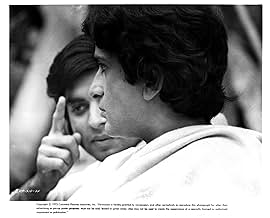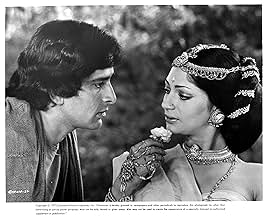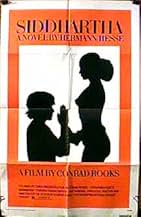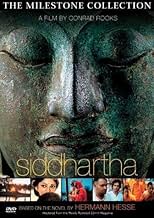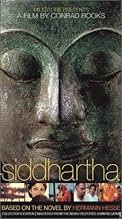AVALIAÇÃO DA IMDb
6,6/10
1,3 mil
SUA AVALIAÇÃO
Adicionar um enredo no seu idiomaThe story of a young Indian who embarks upon a journey to find the meaning of existence. Based on the novel by Hermann Hesse.The story of a young Indian who embarks upon a journey to find the meaning of existence. Based on the novel by Hermann Hesse.The story of a young Indian who embarks upon a journey to find the meaning of existence. Based on the novel by Hermann Hesse.
- Direção
- Roteiristas
- Artistas
Avaliações em destaque
I used to love Hermann Hesse and this book in my teens. Still, I love this film, even because I consider it to be a very appropriate filming.
Hesse's characters are mostly soul-searchers wandering around in rather artificial surroundings - which is true in the case of this timeless, ancient India. As he is prone to put all the meaning into lengthy, philosophical dialogues, this makes him utterly difficult to turn into film.
This film manages to capture both: the artificiality of the setting as well as the philosophical sincereness - plus that certain naive sense of beauty that makes Hesse so appealing and disgusting at once. A good deal of the films success is due to Sven Nykvist's marvellous camera work, done mostly with natural light. (The few scenes with set light are awful.) The beauty of the landscapes is not only the superficial one of a postcard, but the philosophical one that tells you that a beautiful world is essentially a good, complete, happy world: a world in which you can afford to completely focus on your personal search for meaning and spirituality. Well, personally I don't believe this, but this movie had me suspending my belief for 90 minutes. What a comforting experience.
Hesse's characters are mostly soul-searchers wandering around in rather artificial surroundings - which is true in the case of this timeless, ancient India. As he is prone to put all the meaning into lengthy, philosophical dialogues, this makes him utterly difficult to turn into film.
This film manages to capture both: the artificiality of the setting as well as the philosophical sincereness - plus that certain naive sense of beauty that makes Hesse so appealing and disgusting at once. A good deal of the films success is due to Sven Nykvist's marvellous camera work, done mostly with natural light. (The few scenes with set light are awful.) The beauty of the landscapes is not only the superficial one of a postcard, but the philosophical one that tells you that a beautiful world is essentially a good, complete, happy world: a world in which you can afford to completely focus on your personal search for meaning and spirituality. Well, personally I don't believe this, but this movie had me suspending my belief for 90 minutes. What a comforting experience.
After seeing this movie again in New York recently and noticing that it was going to be available on DVD, I ordered it immediately through Amazon.com and decided to send the following comments, which were posted in the "customer reviews" section:
1. The plot. The Nobel Prize winner, Hermann Hesse, wrote Siddhartha in 1922. It is a novel about Eastern spirituality (many Indian scholars consider it as one of the few successful examples of Indian philosophy presented by a Western author). Siddhartha is one of the names given to the Buddha himself. The novel narrates the pilgrimage of the son of a Brahmin, his struggle to find his own destiny; his friendship with Govinda (his "shadow"); his encounters with many different people: the Samanas (the ascetics that practice self-denial); Kamala (a courtesan who claims that she can teach and provide love as an art); Kamasawami (a rich merchant who becomes his boss); and Vasudeva... - note Vasudeva is another name given to Krishna, the teacher/driver of Arjuna in the Bhagavad-Gita).
2. The Movie. In 1972, Conrad Rooks (an almost unknown movie director who made "Chappaqua" in 1966) came out with a 94-minute movie transcription of Hesse's novel. He engaged Sven Nykvist (the famous Swedish cinematographer of Igmar Bergman) and a mainly Indian cast, including Shashi Kapoor (Siddhartha), Simi Garewal (Kamala), Romesh Sharma (Govinda) and Zul Vellani (Vasudeva). The beautiful music was composed by Hemanta Mukherjee (I hope the soundtrack will be available soon). It will be particularly enjoyable for those who have read the book. In many of the scenes the synergism produced by the photography, the music and the acting is superb. And with few exceptions, the movie is a good transcription of the book. The book and the movie became part of the "cult culture" of the West coast of the early seventies, but it never got the attention of the general public. With a condescending tone, Leonard Maltin refers to the movie as "too arty, but on-location photography ... is often dazzling".
After seeing the DVD transfer I was very happy with its high quality. There are 27 interesting minutes of comments made by Conrad Rooks about why and how he made the movie 30 years ago. With the DVD technology I am able to enjoy my favorite scenes and particularly the music of Hemanta Mukherjee on texts from another Nobel Prize, Rabindranath Tagore. Because of these unforgettable moments, I give a rating of 10, absolving Rooks from his "youth sins".
1. The plot. The Nobel Prize winner, Hermann Hesse, wrote Siddhartha in 1922. It is a novel about Eastern spirituality (many Indian scholars consider it as one of the few successful examples of Indian philosophy presented by a Western author). Siddhartha is one of the names given to the Buddha himself. The novel narrates the pilgrimage of the son of a Brahmin, his struggle to find his own destiny; his friendship with Govinda (his "shadow"); his encounters with many different people: the Samanas (the ascetics that practice self-denial); Kamala (a courtesan who claims that she can teach and provide love as an art); Kamasawami (a rich merchant who becomes his boss); and Vasudeva... - note Vasudeva is another name given to Krishna, the teacher/driver of Arjuna in the Bhagavad-Gita).
2. The Movie. In 1972, Conrad Rooks (an almost unknown movie director who made "Chappaqua" in 1966) came out with a 94-minute movie transcription of Hesse's novel. He engaged Sven Nykvist (the famous Swedish cinematographer of Igmar Bergman) and a mainly Indian cast, including Shashi Kapoor (Siddhartha), Simi Garewal (Kamala), Romesh Sharma (Govinda) and Zul Vellani (Vasudeva). The beautiful music was composed by Hemanta Mukherjee (I hope the soundtrack will be available soon). It will be particularly enjoyable for those who have read the book. In many of the scenes the synergism produced by the photography, the music and the acting is superb. And with few exceptions, the movie is a good transcription of the book. The book and the movie became part of the "cult culture" of the West coast of the early seventies, but it never got the attention of the general public. With a condescending tone, Leonard Maltin refers to the movie as "too arty, but on-location photography ... is often dazzling".
After seeing the DVD transfer I was very happy with its high quality. There are 27 interesting minutes of comments made by Conrad Rooks about why and how he made the movie 30 years ago. With the DVD technology I am able to enjoy my favorite scenes and particularly the music of Hemanta Mukherjee on texts from another Nobel Prize, Rabindranath Tagore. Because of these unforgettable moments, I give a rating of 10, absolving Rooks from his "youth sins".
This film is stunning in its beauty. The music is transcendent. For the longest time I tried to get the soundtrack. To save you the trouble, be aware that they never made one! There is one scene in which a woman blows on a shell that was so powerful I still remember 30 years later. Mesmerizing. If you have not seen it yet, rent it today.
It would be easier to write the following comment if the copyright owners, made the film accessible to individual consumers...I`m trying to remember the thematics of this film!! I saw this film 2 years ago on the big screen. This film is far from being about a pointless quest, those are words of a mind that has lost the way , the way to self knowledge, through such questions as: "who am i?"" where did i come from?", and "where am i going?". These might seem irrelevant to the impatient mind but given ample time, the relevancy to all people will become very apparent. What this film conveys is one man`s journey on such a path of "self"knowledge. An indepth appreciation of indian thought or , philosophy or likewise may prove invaluable in terms of understanding , some of the seemingly fleeting or trivial scenes, or more culturally esoteric moments in the film, thus,enabling one to be more fully consummated by its story, however I am sure it is not a prerequisite for the artfully minded!. Among the the features of this film, is the music, of a musician singer who is legendary in India(I cant remember his name right now!)and is certainly legendary in this film, and is certainly a beautiful record of the 'Indian' spirituality alive and breathing to this day in India. If anyone can tell me where i can get the soundtrack or some compilation of the music in this film i would be very appreciative, (this request is a long standing one)
This film would appeal to those people who see or find or sense themselves on a similar"path" or quest, and may give much confirmation or food for thought about the possible turning points, or unknown or unexpected "detours" that one finds themselves engaged in along the way. This film offers a message, a very sound message about the quest of the human spirit its struggle for higher fulfillment, which i add Is the quest of the human being.
This film would appeal to those people who see or find or sense themselves on a similar"path" or quest, and may give much confirmation or food for thought about the possible turning points, or unknown or unexpected "detours" that one finds themselves engaged in along the way. This film offers a message, a very sound message about the quest of the human spirit its struggle for higher fulfillment, which i add Is the quest of the human being.
If you loved the book by Hermann Hesse, you will most likely love this film. At times, it seems rather disjointed - almost as though I had blinked and missed a scene. I really consider this film to be a great companion to a great book. I am curious to know what people who had not read the book would think of this film.
Você sabia?
- CuriosidadesSimi Garewal took the boldest step in her career by going topless for a scene in this film. It was the first topless scene in the history of Bollywood and created a massive uproar. When the scene was featured on the cover of two English magazines, it created more controversy and ended up in court. The film eventually got banned in India. When asked about it years later, Garewal, who said she was never shy, revealed that she would have stripped totally naked if they had let her. In fact, she had been totally nude in front of the filming crew for Mera Naam Joker the same year, but they only showed her from the back onscreen. She said she loved the freedom of losing her inhibitions and her clothes.
- Citações
Siddhartha: I have come to say, that you are all the things that will outlive me, that you, Kamala, will be all the beauty that will be in the shadow we leave. You will be my first love, my only love.
- ConexõesReferenced in Thirtysomething: Melissa and Men (1991)
- Trilhas sonorasMother's Song
by Shanti Hiranand
Principais escolhas
Faça login para avaliar e ver a lista de recomendações personalizadas
- How long is Siddhartha?Fornecido pela Alexa
Detalhes
- Data de lançamento
- Países de origem
- Centrais de atendimento oficiais
- Idioma
- Também conhecido como
- На пути к истине
- Locações de filme
- Empresa de produção
- Consulte mais créditos da empresa na IMDbPro
- Tempo de duração1 hora 29 minutos
- Mixagem de som
- Proporção
- 2.35 : 1
Contribua para esta página
Sugerir uma alteração ou adicionar conteúdo ausente

Principal brecha
By what name was Siddhartha (1972) officially released in Canada in English?
Responda


